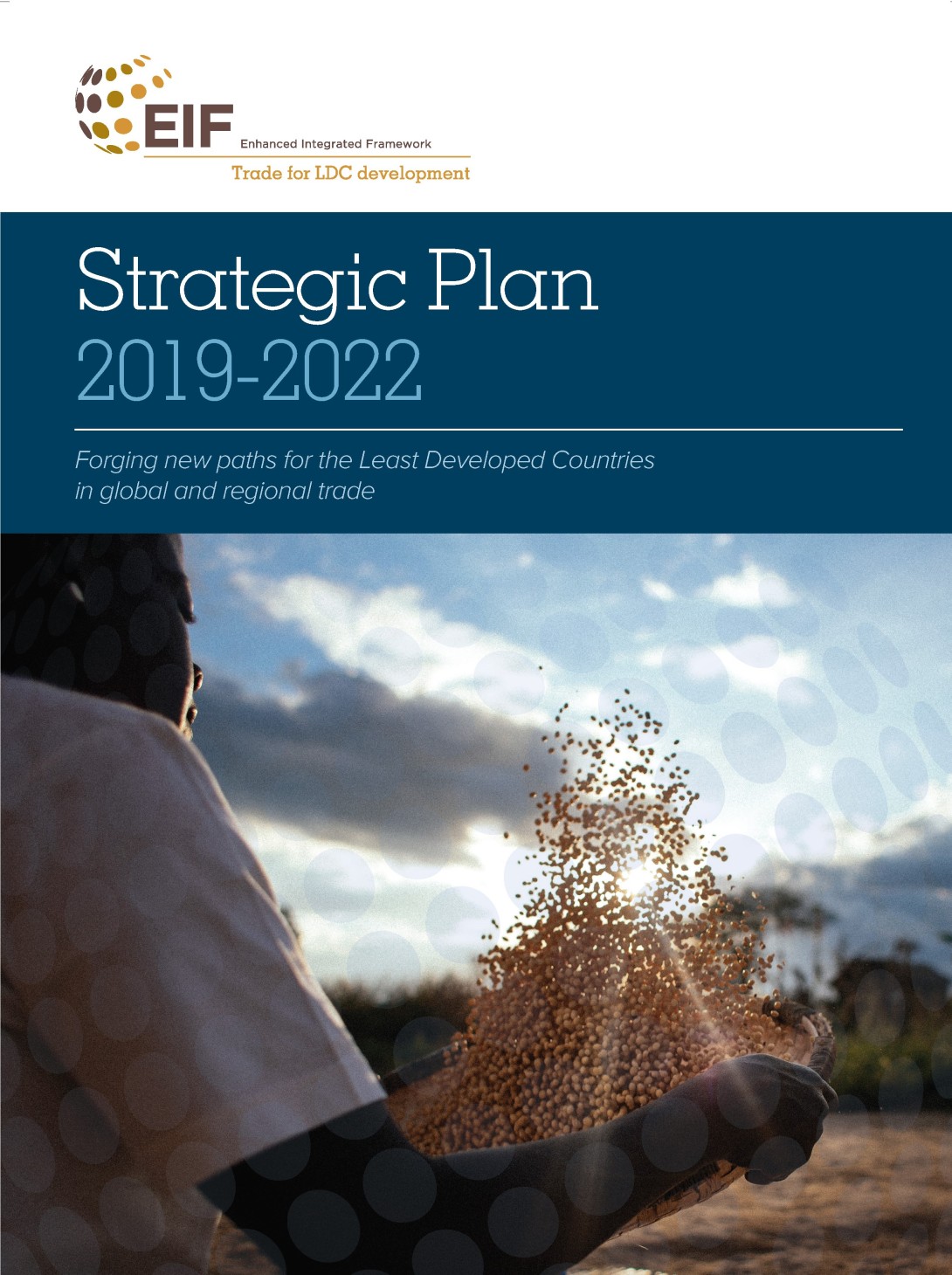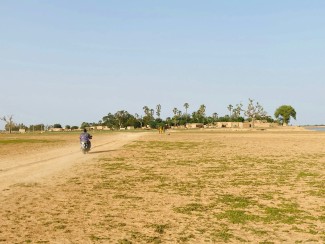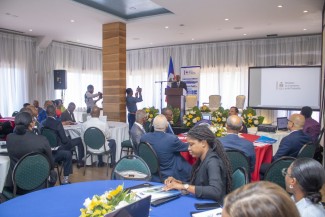The EIF Steering Committee Chair talks contemporary trade challenges and using resources the right way
Why did you volunteer to take up the role as Enhanced Integrated Framework (EIF) Steering Committee Chair?
I met with EIF Executive Director Ratnakar Adhikari in October 2018. We had a good meeting that gave me a lot more insight. I think it’s a small organization, but we believe the work it carries out is very important. So for us, it was very natural to enter into this role. We had supported the organization since it was established. If we can do just a little extra to help the organization move in the right direction, we have reason to do so. That’s why I've taken on this task.
Looking forward to the next EIF Steering Committee meeting in June 2019 and thinking about EIF as a partnership, what is the specific value of EIF versus other organizations or partnerships working in the trade for development space?
It’s my impression that EIF offers some additional guidance and capacity-building for the LDCs. It starts with a dialogue, and ends with joint implementation of specific activities.
And it’s not just a report: it’s a dialogue, it’s a report, it’s capacity-building, and it’s implementation of productive capacity projects. So in that sense it makes good sense to us.
Each context has different issues. Sometimes it’s production, sometimes it’s logistics, sometimes it’s capacity, sometimes it’s infrastructure. You have to analyse it sector by sector, product by product, country by country, and it’s not one-approach-fits all. There is not a standard answer for this: you need to go in with a specific approach for the sector and that’s where I hope donors and the private sector will join and build partnerships and help each other.
There you can say EIF offers specific value, because EIF has the Diagnostic Trade Integration Studies with the World Bank that take on all these challenges.
With the series of WTO reforms currently being proposed, what is your outlook for LDCs, and what can be done to make sure LDCs are taken to account in those processes?
I think we are all challenged right now because of the global environment we are working in. We see it with the general lack of faith in multilateralism, and we see it also specifically at the WTO.
Is it more important than ever that we cooperate on a multilateral basis? I think it is. Is it more difficult than it has been for many years? Apparently. But for a number of reasons.
I do think the challenge the WTO is facing now is very serious, and I think it is as serious for LDCs as it is for developed countries. We have conflict on trade, we have conflict on the organizational setup, we have conflicts on specific details on how to organize specific mechanisms. We have difficulties and challenges across the board.
And who will suffer for it? I believe you and me, and the general population will suffer from it, and that's why it’s so important that we continue to push for reforms and solutions. It’s not a Global South or a Global North issue. It’s much more than that, and it will impact all of us.
Developed countries – they can afford trade wars. They can afford losing the additional one to two percent of additional growth, which is the loss from not having a well-functioning global trade system. However, for those countries that need six, seven, eight percent economic growth just to adapt or cover for the growth in population it’s even more important that we have a well-functioning multilateral system. And this is also and especially within the trade, export and commercial development sectors.
H.E. Morten Jespersen, Ambassador, Permanent Representative of Denmark to the WTO, Chair of the EIF Steering Committee
But I cannot sit here and say that it looks hopeless, because it doesn’t, but sometimes we talk about this as a real uphill struggle. We have to continue and push for multilateralism, and when multilateralism is not possible on a specific issue, we take plurilateralism, where take a smaller number of countries instead of all countries. That has been a practice before when things have been bad, and we believe that this is maybe a way forward in the current climate. Those countries that are ready, they start off and then we see if others might join later on.
Of course there are some institutions where we need reforms quite urgently, and if we don’t get the reforms or have the fixes, then we will all face the same problems: an ineffective WTO, actually, a WTO that will not be able to serve its own function.
How will LDCs fare in the current trading context?
Developed countries – they can afford trade wars. They can afford losing the additional one to two percent of additional growth, which is the loss from not having a well-functioning global trade system. However, for those countries that need six, seven, eight percent economic growth just to adapt or cover for the growth in population it’s even more important that we have a well-functioning multilateral system. And this is also and especially within the trade, export and commercial development sectors.
So all that is to say: We have a responsibility to make this work.
EIF has released a new Strategic Plan. What do you see as the biggest opportunities and challenges during implementation of the plan?
We like the plan, we have been involved in the making of it. It’s a joint donor-LDC-EIF product and we like the plan, we like the idea, and we believe there’s a sufficient focus on value for money… What more to be said?

I think the important issue is that EIF has been through this process of general reform and a ‘value for money’ process, so as a partnership it has become much more adept at delivering what it’s supposed to deliver. But, it has too few resources right now, even with the funding target, so that’s one of the big challenges.
Another challenge is that if we really want impact from what EIF is doing, the partnership will have to be able to leverage resources from other donors for trade and development. If will only do that if it’s spot-on with analysis and the Tier 1 [institutional support] work, and also selection of the right productive capacity projects to fund. So that’s a big challenge.
We also discussed with the Executive Director while he was here about how broadening the donor base, the funding base, that is important. We had a very productive discussion on that.
It’s easier for you to approach new donors – private sector donors, state donors – if you can show sort of good reporting, value for money, audits, progress in the specific activities, etc.
If you look across the board at donors, we are investing more and more in this aid for trade agenda. If you go back ten years we couldn’t even talk about economic growth in the development sector, because it was always about social sectors. Slowly we realised that to create economic progress you need to create economic growth, and with economic growth you can do better on social services.
These sectors used to be silos, but now we understand they are very connected. [In Denmark] we made an analysis of our existing private sector development programs around the world, and they all have the aid for trade elements. We don’t necessarily call them aid for trade. We call them export capacity, productive capacity and so on, but they all have that element.
I think that’s our hope here: We invest, we put money here, we take money out of Danish taxpayers’ money and we spend it on these activities because we believe in it, and that’s also why we will follow the organizations we fund closely and come after them if they don’t spend their money well. We constantly have to monitor and adjust what we have on our agenda.
Any closing thoughts?
We have to be strong on multilateralism, we have to fix the system, we have to continue to offer assistance, we have to be aware of the challenges, and take early action, because what we have done too long is just wait until there’s a problem. It’s actually possible to identify where it’s going to be difficult, but the global system only reacts when there is already a problem. We see it now in the climate debate, it’s only when it starts going very wrong that as a global system we try and come up with a cure. I would hope that we could avoid becoming sick in the first place.
If you would like to reuse any material published here, please let us know by sending an email to EIF Communications: eifcommunications@wto.org.



